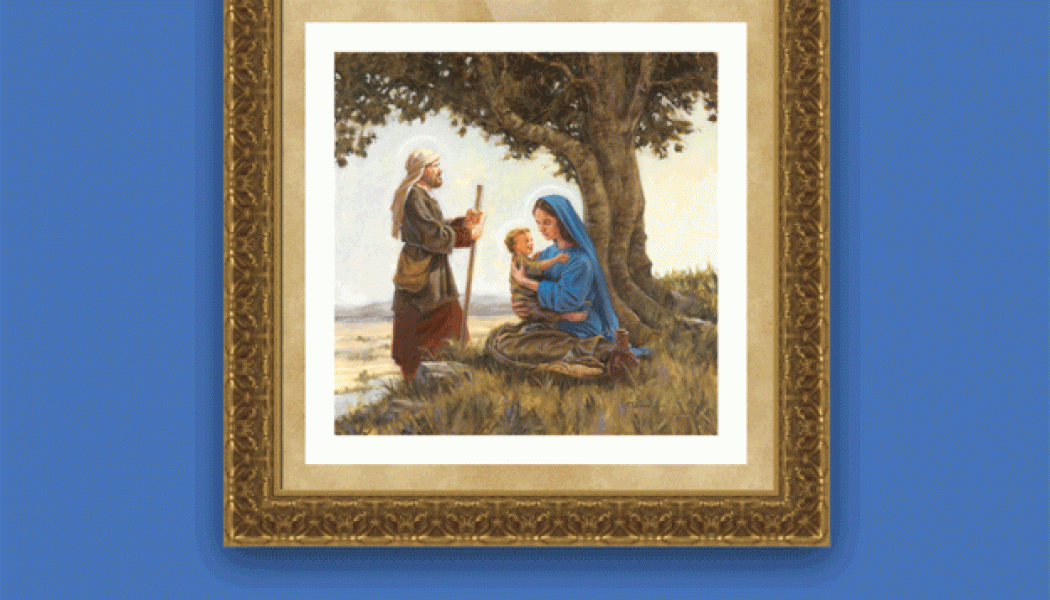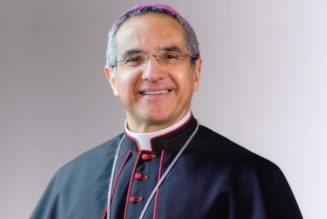By Dr. Jeff Mirus ( bio – articles – email ) | Mar 16, 2021
The Word of God is present in different ways in different things. It is through the Word, after all, that all things that are not God came to be. But let us permit St. John to tell us the full story:
In the beginning was the Word, and the Word was with God, and the Word was God. He was in the beginning with God…. In him was life, and the life was the light of men…. The true light, which gives light to everyone, was coming into the world…. And the Word became flesh and dwelt among us, and we have seen his glory, glory as of the only Son from the Father, full of grace and truth. [cf. Jn 1: 1-16]
This Word was in some way made present through the great prophets of the Old Testament, beginning with Moses. The action of the Word, when it has to do with those realities which are to form our understanding of God Himself, is often not only visible and even public but also beyond the natural and the human mode—that is, to us, miraculous. This is one of many reasons it is so interesting to compare Old Testament miracles with the miracles of Jesus Christ.
OT Miracles
Divine action is manifested throughout the history of the Jewish people, but there are various shadings between what we might regard as God working through natural processes and God doing something that is self-evidently miraculous, because it cannot be explained by natural processes. For example, when God “gives the enemy into Israel’s hands”, as happens repeatedly in the face of the most disheartening odds, this can often be explained simply by a sudden terror afflicting opposing armies which causes them to flee in total disarray. Not so in some cases, of course, as when Moses parted the Red Sea to allow the Jews to escape, after which it closed and swallowed up the Egyptians; or as when Joshua took the city of Jericho by a ritual blowing of trumpets which caused the walls to collapse.
But Joshua had to march around the city seven times, and before him Moses frequently complained of the great load of “this people”, and even he had to have assistants hold up his arms and hands when he grew tired, so that Israel could win a battle. These early miracles, of course, were aimed at the formation of the Jewish people as servants of the Most High God.
But apart from the generally miraculous—or at least completely astonishing—formation and triumph of the Jews, which itself was a rather strenuous triumph also marred repeatedly by sin, unfaithfulness, and consequent failure, perhaps the greatest miracles were performed at the hands of the prophets Elijah and Elisha, as recounted in the Books of Kings. It is interesting to note that, in both cases, a special emphasis is placed on miracles of “providing” or “feeding” and miracles of “healing” or, to reach at last the summit, “reviving from death.” There are in fact parallel cases of each type.
Thus in 1 Kings chapter 17, we find Elijah going to join the widow of Zarephath. The prophet asks her to give him a little food, but she protests that she has little left, and that she and her son (note that there seems so often to be a widow and a son) are about to eat their last and await death. But Elijah says, no, “first make me a little cake…and afterward make something for yourself and your son. For thus says the Lord, the God of Israel: ‘The jar of flour shall not be spent, and the jug of oil shall not empty, until the day that the Lord sends rain upon the earth.’” (cf. 17:8-16).
And so it was. Elijah resided with the widow, but at length her son became ill and died (“his illness was so severe that there was no breath left in him”) (17:17). So she said to Elijah, quite understandably: “What have you against me, O man of God? You have come to me to bring my sin to remembrance and to cause the death of my son” (17:18). But Elijah took the son, carried him upstairs into his room, laid him on his bed, and set about the process of begging God to restore the boy to life. Notice the labor he invests in the process, and how strenuously he implores God to act:
”O Lord my God, have you brought calamity even upon the widow with whom I sojourn, by killing her son?” Then he stretched himself upon the child three times and cried to the Lord, “O Lord my God, let this child’s life come into him again.” [17:20-21]
Similar incidents occur in the ministry of Elisha in 2 Kings chapter 4. First, he is staying with a group of prophets, and the widow of one of them cries out to him: “Your servant my husband is dead…but the creditor has come to take my two children to be his slaves.” She has, sadly, nothing in her possession but a jar of oil. So Elisha says:
Go outside, borrow vessels from all your neighbors, empty vessels and not too few. Then go in and shut the door behind yourself and your sons and pour into all these vessels. And when one is full, set it aside. [vv. 1-3-4]
After much collecting of vessels and pouring into them, the last vessel was filled, and the oil stopped flowing, upon which Elisha told her: “Go, sell the oil and pay your debts, and you and your sons can live on the rest” (v. 7).
After this, Elisha went on to Shunem, where he was given lodging by a wealthy couple whenever he passed that way. When they met, the woman had an elderly husband and no son, so Elijah told her: “At this season, about this time next year, you shall embrace a son” (4:16). The woman thought he was joking (one is reminded of Abraham’s wife, Sarah, who might have been nicknamed “Why did you laugh”, except that nickname had already been reserved for the rest of us). But she conceived and bore a son nonetheless.
Sadly, when the boy had grown, he was struck by a terrible headache and died in his mother’s arms. So she immediately set out to Mount Carmel, where Elisha was then staying, and lamented: “Did I ask my lord for a son? Did I not say, ‘Do not deceive me?’” (v. 28). So Elisha went with her immediately to her home and worked hard on a miracle:
So he went in and shut the door behind the two of them and prayed to the Lord. Then he went up and lay on the child, putting his mouth on his mouth, his eyes on his eyes, and his hands on his hands. And as he stretched himself upon him, the flesh of the child became warm. Then he got up again and walked once back and forth in the house, and went up and stretched himself upon him. The child sneezed seven times, and the child opened his eyes. [vv. 32:35]
Then we come to Christ
Now, compare these accounts with not only the frequency, but the ease and scale of the miracles wrought by the Word of God made flesh as Jesus Christ. To a desperate Simon Peter, who had been fishing all night, He says quite calmly, “Put out into the deep and let down your nets for a catch” (Lk 5:4). So many fish were caught in the net that they had to call James and John, in a nearby boat, to come and help them. (By the way, in The Chosen, this scene is portrayed as an astonishing catch that enables Peter to pay off enormous debts at the very last moment, to avoid imprisonment.)
In another episode, Our Lord directs 4,000 men along with many women and children to sit down and eat their fill from a supply of seven loaves of bread and a few fish (Mt 15:32-38). Seven baskets of food are left over. Or again, He told 5,000 men along with the accompanying women and children to sit down, that they might fill themselves with five loaves and two fish. Tellingly, He gave them to His disciples and told them to distribute this food to others. Appropriately, there was one basket of food left over for each apostle—twelve in all (Mt 14:19-21).
There is little fuss, and less strain, in these stupendous miracles of feeding and providing, not to mention the wine at the wedding feast in Cana. And Our Lord’s miracles of restoring to life are offered equally simply—indeed, almost offhand:
“Go; your son will live.” (Jn 4:50).
“Taking her by the hand he said to her … ‘Little girl, I say to you, arise.’ And he told them to give her something to eat.” (Mk 5:41,43)
“Take away the stone…. Lazarus, come out…. Unbind him, and let him go.” (Jn 11:39:44).
Notice the effortlessness of Christ’s most astonishing miracles. No wonder, after his own Resurrection, His first words were so simple, so discouraging of awe and wonder, which for Our Lord were a part of a far more important and even more human purpose:
Woman, why are you weeping. Whom are you seeking? Mary. Do not cling to me, for I have not yet ascended to the Father; but go to my brothers and say to them, “I am ascending to my Father and your Father, to my God and your God.” [Jn 20:15-17]
We are wise to reflect on this difference in what we might call the quality of the miraculous. Are the results obtained by the Divine manipulation of human emotions, of fear or courage? Are the results obtained through human effort, either in response to specific instructions from God or through strenuous prayer? Or are the results far beyond the human mode, effortless in every way, effected through the simplicity of a genuine personal authority?
And what of that more important, and even more human, purpose? Remember that even the miracles among the Jews by the great prophets were repeatedly marred in their effects by sin, so much as to leave, in the end, far too little real hope. Now, however, consider how and why Christ performs miracles: “But that you know the Son of Man has authority on earth to forgive sins, I say to you, rise, pick up your bed, and go home” (Mk 2:10-11)
As I said at the outset, the Word of God is present in different ways in different things. But it is St. John who tells the full story: “And the Word became flesh and dwelt among us, and we have seen his glory, glory as of the only Son from the Father.” But what is this glory that we have seen? Surely, it is nothing other than the ultimate reality. It is nothing other than “grace and truth”.
Sound Off! CatholicCulture.org supporters weigh in.
All comments are moderated. To lighten our editing burden, only current donors are allowed to Sound Off. If you are a current donor, log in to see the comment form; otherwise please support our work, and Sound Off!

Join Our Telegram Group : Salvation & Prosperity



![“The first thing you can always do is thank God” [must-watch video]…](https://salvationprosperity.net/wp-content/uploads/2022/01/the-first-thing-you-can-always-do-is-thank-god-must-watch-video-327x219.jpg)







